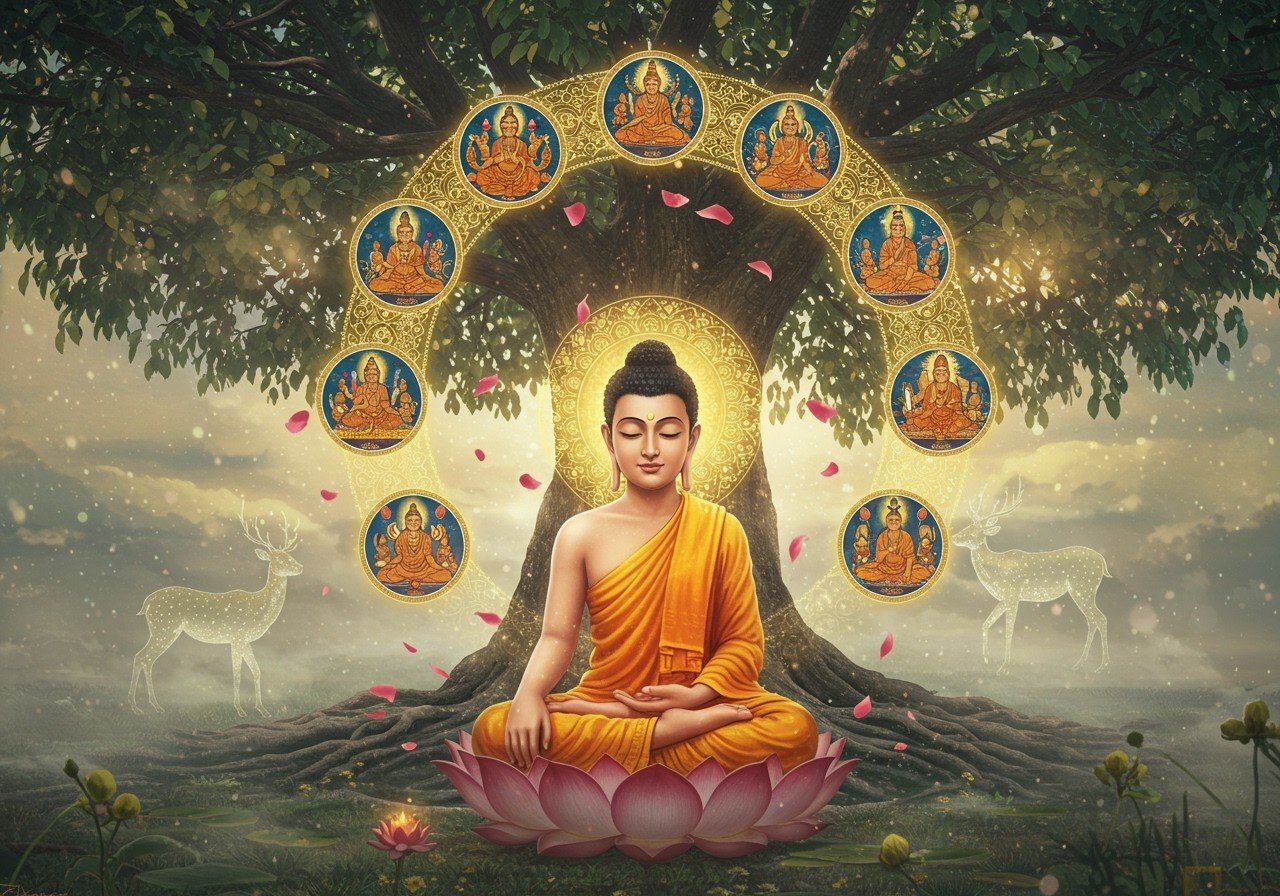
Embark on a journey to understand Gautama Buddha’s profound wisdom, a philosophy that has touched countless lives for centuries. Delve into Buddha’s early life as Prince Siddhartha, his transformative quest for enlightenment, and the enduring significance of his teachings in Indian culture and spirituality. Discover how his philosophy remains remarkably relevant today, offering solace and guidance for those seeking peace and mindfulness in our modern world.
The Life of Gautama Buddha
Born into royalty as Prince Siddhartha, Gautama Buddha lived a life of luxury. However, his sheltered existence was shattered upon encountering the Four Sights: an old man, a sick man, a corpse, and an ascetic. These stark realities exposed him to the inevitable suffering inherent in human existence. This profound experience led him to renounce his princely life, embarking on a spiritual quest for truth and enlightenment, known as the Great Renunciation.
Siddhartha initially pursued severe asceticism, but found it ultimately unfulfilling. His path led him to the Bodhi tree, where, through deep meditation, he achieved enlightenment and became known as Gautama Buddha. These pivotal moments—the Great Renunciation and his enlightenment—fundamentally shaped his teachings and the foundation of Buddhism.
The Core Teachings: The Four Noble Truths
The First Noble Truth: Dukkha (Suffering)
Suffering is an intrinsic part of life, manifesting in various forms—physical, emotional, and existential. Understanding and accepting this universal truth is the first crucial step on the Buddhist path.
The Second Noble Truth: Samudaya (Origin of Suffering)
The root of suffering lies in desire, attachment, and ignorance (avidyā). Recognizing and addressing these causes are essential for alleviating suffering.
The Third Noble Truth: Nirodha (Cessation of Suffering)
Liberation from suffering is attainable by eliminating its root causes. This truth offers hope and a path towards a peaceful existence.
The Fourth Noble Truth: Magga (Path to the Cessation of Suffering)
The Noble Eightfold Path serves as a practical guide to eradicate suffering and achieve enlightenment, providing a structured framework for cultivating wisdom, ethical conduct, and mental discipline. It offers a step-by-step approach to achieve lasting peace and liberation.
The Noble Eightfold Path
Right Understanding (Samma Ditthi)
Comprehending the Four Noble Truths and the nature of reality forms the bedrock of Buddhist practice. This foundational understanding guides all other aspects of the Eightfold Path.
Right Intent (Samma Sankappa)
Cultivating wholesome intentions—renunciation, goodwill, and non-harming—shapes our actions and experiences, leading to positive outcomes and karmic consequences.
Right Speech (Samma Vaca)
Speaking truthfully, kindly, and constructively fosters harmony, trust, and positive relationships. Ethical speech is crucial for creating a peaceful and supportive environment.
Right Action (Samma Kammanta)
Engaging in actions that refrain from harming others is fundamental to ethical conduct. Moral behavior is essential for creating a just and compassionate society.
Right Livelihood (Samma Ajiva)
Earning a living in a way that avoids causing harm or injustice supports both individual and collective well-being. Ethical livelihood contributes to a sustainable and equitable society.
Right Effort (Samma Vayama)
Consistent effort to cultivate positive thoughts and actions while avoiding negative ones is crucial for personal growth and spiritual development. This requires continuous self-reflection and mindful awareness.
Right Mindfulness (Samma Sati)
Maintaining awareness of one’s body, feelings, mind, and surrounding phenomena cultivates clarity and presence in daily life. Mindfulness allows us to observe our experiences without judgment, fostering a deeper understanding of ourselves and the world around us.
Right Concentration (Samma Samadhi)
Practicing deep meditation cultivates mental focus, tranquility, and deeper states of consciousness. Concentration enhances self-awareness and leads to profound insights and inner peace.
Practical Applications of Buddha’s Philosophy in Daily Life
-
Meditation for Mindfulness: Incorporate regular meditation practice to cultivate mindfulness, enhancing your awareness of the present moment and fostering inner peace. Explore different meditation techniques to find what resonates with you. Discover meditation resources and guidance at poojn.in.
-
Compassion and Kindness: Practice compassion and kindness in all your interactions, fostering positive relationships and contributing to a more harmonious environment. Extend this kindness not only to others but also to yourself.
-
Contentment through Detachment: Reduce attachment to material possessions and desires to cultivate contentment and inner peace. Recognize that true happiness comes from within, not from external sources.
-
Ethical Conduct: Strive to live ethically in your speech, actions, and livelihood, creating positive karma and contributing to a more just and compassionate world. Align your actions with your values.
-
Balanced Lifestyle: Maintain a balanced lifestyle that incorporates physical well-being, mental clarity, and emotional stability. Nurture all aspects of your being for holistic health.
Exploring Buddhism Further
Want to learn more about incorporating Buddhist principles into your life? Explore these resources:
-
Rudraksha and Tulsi: Sacred Hindu Symbols Explained: While not strictly Buddhist, these symbols are often used in spiritual practices and can complement your journey. Discover their significance and how they can enhance your meditation practice.
-
Online Puja Bookings: Embrace Technology for Simple Rituals: Explore online resources and services that support your spiritual practice. Connect with experienced practitioners and learn more about Buddhist rituals.
Poojn.in: Supporting Your Spiritual Journey
Poojn.in offers a curated selection of products to support your exploration and practice of Buddhist principles:
-
Tulsi Mala: Enhance your meditation practice with a traditional Tulsi mala. This sacred wood is believed to have calming properties and can deepen your connection to your practice.
-
Mangalam Camphor: Create a serene atmosphere for meditation with the purifying scent of Mangalam camphor.
The Enduring Legacy of Gautama Buddha
Gautama Buddha’s philosophy has left an indelible mark on human history, profoundly influencing Indian and global spirituality. His teachings have contributed to psychology through mindfulness practices, inspired art, literature, and architecture, and promoted peace and interfaith dialogue. Even today, his wisdom continues to guide countless individuals seeking a path to inner peace, enlightenment, and a more meaningful life.


